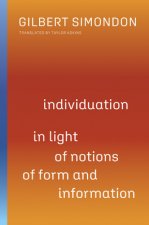
Kód: 04534906
Ignorance and Moral Obligation
Autor Michael J. Zimmerman
Ignorance and Moral Obligation concerns whether and how our ignorance about ourselves and our circumstances affects what our moral obligations and moral rights are. Michael J. Zimmerman begins by distinguishing three well-establis ... celý popis
- Jazyk:
 Angličtina
Angličtina - Väzba: Pevná
- Počet strán: 160
Nakladateľ: Oxford University Press, 2014
- Viac informácií o knihe

101.15 €
Dostupnosť:
50 % šanca Máme informáciu, že by titul mohol byť dostupný. Na základe vašej objednávky sa ho pokúsime do 6 týždňov zabezpečiť.
Máme informáciu, že by titul mohol byť dostupný. Na základe vašej objednávky sa ho pokúsime do 6 týždňov zabezpečiť.Prehľadáme celý svet
Mohlo by sa vám tiež páčiť
-

On the Happiness of the Philosophic Life
74.53 € -

Tarot Illuminati
34.60 € -

Lenin and Philosophy and Other Essays
22.72 € -

Funny Girl
12.58 € -13 % -

The Adventures of Captain Stinky and Sailor Puss: Captain Stinky and Sailor Puss Rescue a Pirate
15.65 € -3 % -

MÁGOA DAS PEDRAS -Joaquim Castro Caldas
13.40 €
Darčekový poukaz: Radosť zaručená
- Darujte poukaz v ľubovoľnej hodnote, a my sa postaráme o zvyšok.
- Poukaz sa vzťahuje na všetky produkty v našej ponuke.
- Elektronický poukaz si vytlačíte z e-mailu a môžete ho ihneď darovať.
- Platnosť poukazu je 12 mesiacov od dátumu vystavenia.
Informovať o naskladnení knihy
Zadajte do formulára e-mailovú adresu a akonáhle knihu naskladníme, zašleme vám o tom správu. Postrážime všetko za vás.
Viac informácií o knihe Ignorance and Moral Obligation
Nákupom získate 250 bodov
 Anotácia knihy
Anotácia knihy
Ignorance and Moral Obligation concerns whether and how our ignorance about ourselves and our circumstances affects what our moral obligations and moral rights are. Michael J. Zimmerman begins by distinguishing three well-established views about the nature of moral obligation: the Objective, Subjective, and Prospective Views. Some philosophers have attempted to reconcile the three views in question, but these attempts are shown to fail. The question thus arises: which of the three views ought to be accepted and which rejected? Zimmerman argues that, in light of the ignorance that besets us, the Objective and Subjective Views should be rejected and the Prospective View accepted. The argument is based on close consideration of a kind of case provided by Frank Jackson, one in which an agent has deficient evidence regarding the outcomes of his options. Many objections to this argument are entertained and rebutted, by means of which the Prospective View is itself elaborated and defended. Among those who accept the Prospective View, the primary motivation for doing so has often been that of finding a useful guide to action, but Zimmerman argues that the Prospective View can be only of strictly limited help in providing such a guide. Finally, he addresses some implications that the Prospective View has regarding the nature of moral rights. Our possession of moral rights is precarious, being dependent on the evidence possessed by others. Once again, several objections are entertained and rebutted. The distinction between rights and desert is stressed, and the relevance of risk to rights is explored.
 Parametre knihy
Parametre knihy
Zaradenie knihy Knihy po anglicky Humanities Philosophy Philosophy: epistemology & theory of knowledge
101.15 €
- Celý názov: Ignorance and Moral Obligation
- Autor: Michael J. Zimmerman
- Jazyk:
 Angličtina
Angličtina - Väzba: Pevná
- Počet strán: 160
- EAN: 9780199688852
- ISBN: 0199688850
- ID: 04534906
- Nakladateľ: Oxford University Press
- Hmotnosť: 322 g
- Rozmery: 180 × 220 × 15 mm
- Dátum vydania: 27. March 2014
Obľúbené z iného súdka
-

Tetralogue
10.13 € -22 % -

Short History of Decay
11.15 € -23 % -

Trade Like a Stock Market Wizard: How to Achieve Super Performance in Stocks in Any Market
28.56 € -13 % -

Outer Limits of Reason
24.87 € -12 % -

Fabric of Reality
15.14 € -5 % -

Beyond Good and Evil
10.74 € -19 % -

What Does It All Mean?
54.25 € -

Hamlet's Mill
22.82 € -18 % -

Truth and Method
42.89 € -

Goethe's Theory of Knowledge
19.85 € -6 % -

Ego Tunnel
24.67 € -

Manual for Creating Atheists
14.84 € -8 % -

Objectivity
29.99 € -14 % -

What Does It All Mean?
40.33 € -

Lectures on the Will to Know
19.65 € -18 % -

Introduction to the Theory of Knowledge
46.58 € -

Subjectivity and Selfhood
38.38 € -

Hermeneutics: A Very Short Introduction
10.13 € -22 % -

Opacity of Mind
22.92 € -

Oxford IB Diploma Programme: Theory of Knowledge Course Companion
83.54 € -

Pearson Baccalaureate Theory of Knowledge second edition print and ebook bundle for the IB Diploma
62.04 € -

Against Method
27.43 € -

Posthuman Knowledge
21.70 € -

Knowledge: A Very Short Introduction
9.10 € -24 % -

Being Wrong
12.28 € -23 % -

Introduction to Objectivist Epistemology
30.50 € -

Ecstasy of Communication
16.37 € -6 % -

Ego Trick
11.15 € -23 % -

Thought as a System
59.89 € -

Self and Other
43.81 € -

Reasons and Causes
152.14 € -

Soul of the Marionette
12.28 € -23 % -

Cambridge Companion to Kant's Critique of Pure Reason
36.13 € -12 % -

Truth
16.58 € -4 % -

Artistic Truth
61.52 € -

Self
12.28 € -23 % -

Freedom Regained
11.15 € -23 % -

Transformative Experience
30.71 € -

Gregory Bateson
24.46 € -5 % -

Agnotology
28.97 € -7 % -

On Truth and Untruth
12.58 € -

Introduction to the Theory of Knowledge 2e
27.63 € -

Failure
23.64 € -19 % -

Individuation in Light of Notions of Form and Information
34.70 € -

Mystique of Enlightenment
20.36 € -

In Over Our Heads
43.81 € -4 % -

Individuation in Light of Notions of Form and Information
34.70 € -

Philosophical Hermeneutics Reinterpreted
73.09 € -

Quine and His Place in History
139.54 €
Osobný odber Bratislava a 2642 dalších
Copyright ©2008-24 najlacnejsie-knihy.sk Všetky práva vyhradenéSúkromieCookies


 19 miliónov titulov
19 miliónov titulov Vrátenie do mesiaca
Vrátenie do mesiaca 02/210 210 99 (8-15.30h)
02/210 210 99 (8-15.30h)